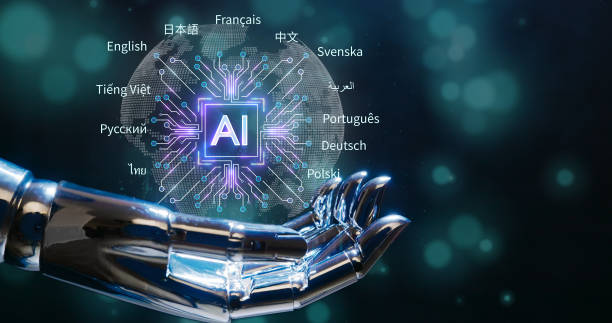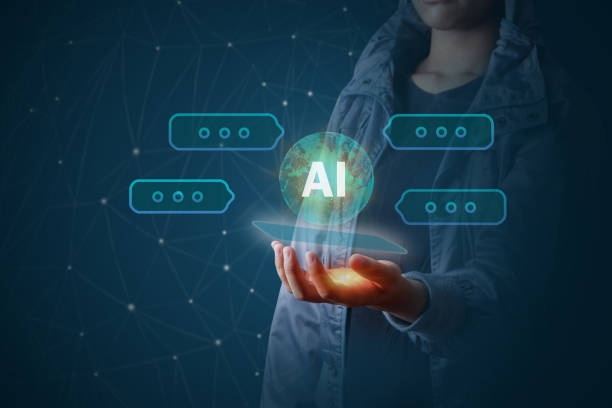What is Artificial Intelligence? Definition, History, and Basic Concepts

#Artificial_Intelligence (AI) is a branch of computer science that deals with building machines that can perform tasks that typically require human intelligence.
These tasks include learning, reasoning, problem-solving, natural language understanding, and computer vision.
Artificial Intelligence has its roots in the 1950s, when scientists like Alan Turing and John McCarthy began to explore the possibility of building intelligent machines.
The term ‘Artificial Intelligence’ was coined by John McCarthy in 1956.
Throughout history, artificial intelligence has faced periods of ups and downs.
In the 1960s and 1970s, early advancements in AI created significant hope, but it soon became clear that solving complex problems with AI was much more difficult than imagined.
This led to a period of decline in funding and interest in AI, known as the ‘AI winter’.
However, in the 1980s and 1990s, with the development of new algorithms and increased computational power, AI experienced a resurgence.
Today, artificial intelligence is used in a wide range of applications, including:
- Face Recognition
- Language Translation
- Self-driving Cars
- Robotics
- Medicine
Artificial Intelligence is divided into two main categories:
- Weak Artificial Intelligence (Narrow AI): This type of AI is designed to perform a specific task.
For example, a face recognition program is a weak AI. - Strong Artificial Intelligence (General AI): This type of AI possesses human-like intelligence and can perform any task that a human can.
Strong AI is still in the developmental stages and has not yet been fully realized.
Did you know that poor online store design can drive away up to 70% of your potential customers? Rasawweb revolutionizes your sales with professional and user-friendly e-commerce website designs.
✅ Significant increase in sales and revenue
✅ Full optimization for search engines and mobile
⚡ [Get free consultation from Rasawweb]
Widespread Applications of Artificial Intelligence in Various Industries

Artificial intelligence is rapidly becoming a key technology in various industries.
The learning, reasoning, and problem-solving capabilities of #Artificial_Intelligence help organizations increase their efficiency, reduce costs, and offer new products and services.
Here are some of the main applications of artificial intelligence in various industries:
Healthcare:
Artificial intelligence is used in diagnosing diseases, developing new drugs, personalizing treatments, and managing hospitals.
AI-based systems can analyze medical images, identify disease patterns, and assist doctors in treatment decisions.
Also, AI-powered chatbots can help patients with answering questions, scheduling appointments, and following up on treatment.
Finance:
Artificial intelligence is used in fraud detection, risk management, algorithmic trading, and customer service.
AI-based systems can identify suspicious patterns in financial transactions and prevent fraud.
Also, robotic financial advisors can help clients manage investments and financial planning.
Retail:
Artificial intelligence is used in personalizing the customer shopping experience, inventory management, demand forecasting, and pricing optimization.
AI-based systems can analyze customer buying behavior and suggest relevant products and services.
Also, AI-powered robots can assist customers in stores and provide product information.
Manufacturing:
Artificial intelligence is used in automating production processes, quality control, predictive maintenance, and supply chain optimization.
AI-based systems can control machinery, identify product defects, and prevent equipment failures.
Also, AI-powered robots can work on production lines and perform repetitive and dangerous tasks.
Transportation:
Artificial intelligence is used in the development of self-driving cars, optimizing transportation routes, and traffic management.
Self-driving cars can operate without human intervention, increasing safety and efficiency in transportation.
AI-based systems can predict traffic and suggest optimal routes for drivers.
Advantages and Disadvantages of Artificial Intelligence

Artificial Intelligence (AI), with its vast potential, comes with numerous advantages and disadvantages.
Understanding these pros and cons is essential for responsible and informed use of this technology.
Advantages:
- Increased Efficiency: #Artificial_Intelligence can automate repetitive and time-consuming tasks, leading to increased efficiency and productivity across various industries.
- Reduced Error: AI systems can operate with higher accuracy than humans, reducing the likelihood of errors.
- Improved Decision-Making: AI can analyze large volumes of data and identify patterns that humans cannot see, leading to better and more informed decisions.
- Better Service Provision: AI can provide more personalized services to customers and improve the user experience.
- Solving Complex Problems: AI can be used to solve complex problems that humans are unable to solve, such as discovering new drugs or predicting climate change.
Disadvantages:
- High Cost: Developing and implementing AI systems can be expensive.
- Complexity: AI systems can be complex and difficult to understand and manage.
- Data Dependency: AI requires a large amount of data to learn and function correctly.
- Bias: If the data used to train AI systems contains bias, the system may also produce discriminatory results.
- Job Displacement: Automation driven by AI may lead to job losses in some industries.
- Ethical Concerns: The use of AI raises numerous ethical concerns, such as privacy, security, and accountability.
Ultimately, success in using AI requires a full understanding of its advantages and disadvantages, as well as attention to the ethical and social issues associated with this technology.
| Advantages | Disadvantages |
|---|---|
| Increased Efficiency | High Cost |
| Reduced Error | Complexity |
| Improved Decision-Making | Data Dependency |
| Better Service Provision | Bias |
| Solving Complex Problems | Job Displacement |
Machine Learning and Neural Networks in Artificial Intelligence

Machine Learning and Neural Networks are two fundamental concepts in the field of Artificial Intelligence.
Machine learning allows machines to learn from data and improve their performance without explicit programming.
Neural networks are computational models inspired by the structure of the human brain, used for learning complex patterns and relationships in data.
Machine Learning:
Machine learning is divided into two main categories:
- Supervised Learning: In this method, the machine is trained using labeled data.
Labeled data includes inputs and expected outputs.
The machine learns patterns in the data and uses them to predict outputs for new inputs. - Unsupervised Learning: In this method, the machine is trained using unlabeled data.
The machine tries to discover patterns and structures in the data.
Neural Networks:
Neural networks consist of multiple layers of nodes (neurons) that are interconnected.
Each node performs a simple mathematical function, and its output is sent to the nodes in the next layer.
By adjusting the weights of connections between nodes, the neural network can learn complex patterns and relationships in the data.
Deep Neural Networks are neural networks with many layers that are capable of learning very complex patterns.
Machine learning and neural networks are used in a wide range of applications, including:
- Image Recognition
- Speech Recognition
- Natural Language Processing
- Price Prediction
- Recommender Systems
With recent advancements in machine learning and neural networks, AI is increasingly becoming a powerful technology that can solve complex problems and improve our lives.
Does your current website build the trust that potential customers should have in your business?
If the answer is no, it’s time to have your professional and impactful corporate website with Rasawweb.
✅ Fully custom design tailored to your brand identity
✅ Increased lead generation and business credibility in the eyes of customers⚡ Contact us for a free consultation!
What Will Be the Future of Artificial Intelligence?

The future of #Artificial_Intelligence comes with exciting potentials and significant challenges.
Rapid advancements in this field are leading us towards a world where AI plays a more crucial role in daily life and various industries.
Predictions for the Future:
- Artificial General Intelligence (AGI): One of the main goals in AI is the development of Artificial General Intelligence, which possesses human-like intelligence and can perform any task that a human can.
Although there is still a long way to go to achieve AGI, research in this field is progressing rapidly. - Widespread Automation: AI is increasingly automating various tasks, including repetitive tasks and those requiring specialized skills.
This automation can lead to increased efficiency and productivity in various industries, but it may also lead to job displacement in some areas. - AI in Everyday Life: AI will increasingly be present in our daily lives, including in homes, cars, smartphones, and other devices.
This can make our lives easier, more convenient, and more enjoyable. - AI in Science and Technology: AI can be used to solve complex problems in science and technology, including discovering new drugs, developing new materials, and predicting climate change.
Challenges:
- AI Ethics: As the power of AI increases, ethical issues associated with it also become more important.
These issues include privacy, security, accountability, and bias. - AI Security: AI systems can be targets for cyberattacks.
Protecting AI systems from these attacks is crucial. - Social Impact of AI: Automation driven by AI can have significant social impacts, including job displacement and increased inequality.
To leverage the benefits of artificial intelligence and mitigate its risks, it is necessary to use this technology responsibly and consciously, paying attention to the ethical and social issues associated with it.
Artificial Intelligence and Its Impact on the Job Market

Artificial Intelligence (AI) is increasingly transforming the job market.
AI-driven automation can eliminate some jobs, but it can also create new job opportunities and increase productivity.
Negative Impacts:
- Job Displacement: Automation can lead to job losses in some industries, especially in those with repetitive and routine tasks.
- Need for New Skills: To succeed in the future job market, individuals must learn new skills that are compatible with AI.
- Increased Inequality: Automation may lead to increased inequality in society, as individuals with the necessary skills in the future job market will earn more.
Positive Impacts:
- Creation of New Job Opportunities: AI can create new job opportunities in fields such as AI development, data engineering, data science, and AI ethics.
- Increased Productivity: AI can automate repetitive and time-consuming tasks, leading to increased productivity and reduced costs.
- Improved Working Conditions: AI can automate dangerous and difficult tasks, leading to improved working conditions and reduced occupational injuries.
To prepare for the impact of AI on the job market, individuals must learn new skills, such as problem-solving skills, critical thinking skills, communication skills, and collaboration skills.
Additionally, governments and organizations must provide programs for workforce training and retraining.
AI is a powerful technology that can have a significant impact on the job market.
By preparing for these changes, we can benefit from the advantages of AI and mitigate its risks.
Ethical Issues Surrounding Artificial Intelligence

Artificial Intelligence (AI), with its remarkable advancements, also brings a set of ethical issues that require careful attention and consideration.
These ethical issues can have profound impacts on society and human lives.
Privacy:
AI systems require large amounts of data to learn and function correctly.
The collection and use of this data can raise concerns about privacy.
How can we protect individuals’ privacy from data misuse?
Bias:
If the data used to train #Artificial_Intelligence systems contains bias, the system may also produce discriminatory results.
How can we prevent bias in AI systems?
Accountability:
When an AI system makes a mistake, who is responsible? Should developers, manufacturers, or users bear the responsibility?
Transparency:
AI systems are often complex and difficult to understand.
How can we ensure that these systems are transparent and explainable?
Control:
As AI advances, the question arises of who should control this technology? How can we prevent the misuse of AI?
Security:
AI systems can be targets for cyberattacks.
How can we protect AI systems from these attacks?
To resolve these ethical issues, we need collaboration between AI experts, ethicists, policymakers, and the general public.
We must establish legal and ethical frameworks that ensure the responsible and safe use of AI.
| Ethical Issue | Description |
|---|---|
| Privacy | Concern about data collection and use |
| Bias | Likelihood of producing discriminatory results |
| Accountability | Unclear responsibility in case of error |
| Transparency | Complexity and incomprehensibility of systems |
| Security | Cyberattacks on AI systems |
Artificial Intelligence and Its Role in Sustainable Development

Artificial Intelligence (AI) can play a significant role in achieving the United Nations Sustainable Development Goals (SDGs).
These goals include eradicating poverty, combating climate change, ensuring quality education, and promoting health and well-being.
Artificial intelligence can contribute to sustainable development in various areas:
Environment:
- Predicting and Managing Climate Change: AI can be used to analyze climate data and predict climate change.
This information can help governments and organizations develop more effective policies to reduce greenhouse gas emissions and adapt to climate change. - Optimizing Energy Consumption: AI can be used to optimize energy consumption in buildings, factories, and power grids.
This can lead to reduced energy consumption and lower greenhouse gas emissions. - Managing Natural Resources: AI can be used to manage natural resources such as water, forests, and mines.
This can lead to more sustainable use of these resources and environmental protection.
Social:
- Improving Health and Well-being: AI can be used to diagnose diseases, develop new drugs, and provide better healthcare.
This can lead to improved health and well-being for individuals. - Promoting Quality Education: AI can be used to provide personalized education and improve the quality of education.
This can lead to increased access to education and improved educational outcomes. - Reducing Poverty and Inequality: AI can be used to create new job opportunities and reduce poverty and inequality.
This can lead to improved living conditions for individuals.
Economic:
- Increasing Productivity and Economic Growth: AI can be used to automate production processes, improve the quality of products and services, and create new business opportunities.
This can lead to increased productivity and economic growth. - Developing Sustainable Industries: AI can be used to develop sustainable industries such as renewable energy and sustainable agriculture.
This can lead to the creation of new jobs and reduced environmental impacts.
For effective use of AI in sustainable development, we need collaboration among governments, organizations, companies, and individuals.
We must establish policies and frameworks that ensure the responsible and safe use of AI and address its associated ethical and social issues.
Are your online sales not what you expected? With Rasawweb, permanently solve the problem of low sales and poor user experience!
✅ Increase visitor-to-customer conversion rate
✅ Create an enjoyable user experience and increase customer trust
⚡ Act now to get a free consultation!
How to Learn Artificial Intelligence? Resources and Learning Paths

Learning Artificial Intelligence (AI) can be a valuable investment in the future.
Given the rapid growth of this technology, the demand for AI specialists is increasing.
Fortunately, there are numerous resources and learning paths to start and progress in this field.
Online Resources:
- Online Courses: Online learning platforms such as Coursera, edX, Udemy, and DataCamp offer various courses in AI.
These courses can cover basic concepts of AI, machine learning, neural networks, and other related topics. - Free Tutorials: Many universities and organizations offer free tutorials in AI.
These tutorials can be an excellent starting point for familiarizing yourself with this technology. - Online Forums and Communities: Joining AI online forums and communities can help you connect with other enthusiasts and experts in this field, ask your questions, and learn from others’ experiences.
- Articles and Blogs: Reading articles and blogs related to AI can help you stay informed about the latest advancements and trends in this field.
Offline Resources:
- Books: There are numerous books on AI that can cover basic and advanced concepts of this technology.
- Workshops and Conferences: Participating in AI workshops and conferences can help you meet experts in this field, learn about the latest research and innovations, and develop your skills.
- University Courses: Taking university courses in AI-related fields such as computer science, electrical engineering, and mathematics can provide a strong foundation for learning this technology.
Learning Paths:
- Start with Basic Concepts: Before starting to learn advanced concepts, make sure you have a good understanding of the basic concepts of AI.
- Choose a Programming Language: To work with AI, you need to learn a programming language like Python.
- Practice and Hands-on Projects: To reinforce your learning, complete hands-on projects and practice your skills.
- Continue Learning: AI is an evolving field, so you need to continuously update your knowledge and stay informed about the latest advancements.
With effort and perseverance, you can learn Artificial Intelligence and benefit from the career and business opportunities of this technology.
Artificial Intelligence in Iran: Current Status and Challenges

Artificial Intelligence (AI) in Iran, like in other countries worldwide, is rapidly developing and expanding.
However, Iran faces specific challenges in this field that require careful attention and planning.
Current Status:
- Research and Development: In Iran, research and development in AI are being conducted in universities, research centers, and private companies.
This research includes various fields such as machine learning, natural language processing, machine vision, and robotics. - Applications: AI is used in Iran in various fields such as healthcare, finance, transportation, agriculture, and security.
- Startups: A number of startups in Iran are active in the field of AI, developing innovative products and services.
- Human Resources: Iran has a young and educated workforce with high potential for AI development.
Challenges:
- Lack of Investment: One of the main challenges in AI development in Iran is the lack of investment.
To compete with other countries, more investment is needed in this field. - Sanctions: Economic sanctions have limited access to advanced technologies and equipment required for AI development.
- Data Scarcity: AI requires large amounts of data to learn and function correctly.
The lack of quality data is another challenge for AI development in Iran. - Shortage of Specialists: In Iran, there is a shortage of experienced specialists in the field of AI.
To address this shortage, training and educating specialized human resources in this field are necessary. - Ethical Issues: With the development of AI, ethical issues associated with it also become more important.
To ensure the responsible and safe use of AI, attention to ethical issues is necessary.
To overcome these challenges and develop AI in Iran, precise planning, appropriate investment, training of specialized human resources, and attention to ethical issues are necessary.
By taking these actions, Iran can play an important role in the development and use of AI globally.
Frequently Asked Questions
| Question | Answer |
|---|---|
| What is Artificial Intelligence? | It is the simulation of human intelligence in machines programmed to think like humans and mimic their actions. |
| What are the main branches of Artificial Intelligence? | They include machine learning, deep learning, natural language processing, computer vision, and robotics. |
| What is Machine Learning? | It is a branch of artificial intelligence that focuses on enabling systems to learn from data and identify patterns without explicit programming. |
| Mention examples of Artificial Intelligence applications in our daily lives. | Voice assistants (like Siri and Alexa), recommendation systems in Netflix and Amazon, self-driving cars, and facial recognition software. |
| What is Deep Learning? | It is a subset of machine learning that uses multi-layered (deep) artificial neural networks to process large amounts of data. |
| What is Natural Language Processing (NLP)? | It is a branch of artificial intelligence that focuses on enabling computers to understand, interpret, and generate human language. |
| What are some ethical concerns related to Artificial Intelligence? | They include data bias, privacy, job displacement, and accountability in case of errors. |
| What are the main benefits of Artificial Intelligence? | Increased efficiency, improved decision-making, automation of repetitive tasks, and discovery of complex patterns in data. |
| How is Artificial Intelligence used in healthcare? | In disease diagnosis, drug discovery, medical image analysis, and personalized patient care. |
| How do you see the future of Artificial Intelligence? | It is expected to continue evolving rapidly, impacting all aspects of human life, from industry to education and entertainment. |
And other advertising agency services by Rasawweb in the field of advertising
- Smart Reportage: A combination of creativity and technology to increase website traffic through intelligent data analysis.
- Smart Sales Automation: An effective tool for online growth with the help of custom programming.
- Smart Reportage: A professional solution for customer acquisition focusing on precise audience targeting.
- Smart UI/UX: A dedicated service for growth in click-through rates based on user experience customization.
- Smart Customer Journey Map: A fast and efficient solution for increasing website traffic with a focus on marketing automation.
And over hundreds of other services in internet advertising, advertising consultation, and organizational solutions
Internet Advertising | Advertising Strategy | Advertorial
Sources
Artificial Intelligence, Future-maker and Challenges
Amazing Opportunities of Artificial Intelligence
Review of Artificial Intelligence Challenges
The Future of Artificial Intelligence in Iran
? For a powerful and lasting presence in the digital space, Rasawweb Afarin Digital Marketing Agency is your constant business partner, offering innovative solutions including fast and professional website design.
📍 Tehran, Mirdamad Street, next to Central Bank, Southern Kazeroon Alley, Ramin Alley, No. 6




